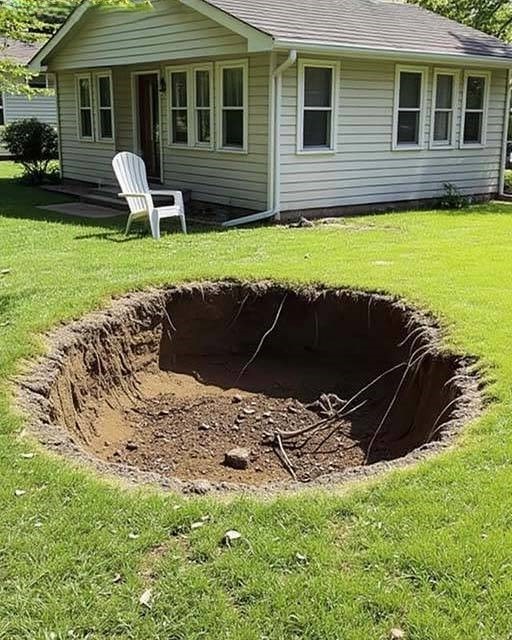I wasn’t supposed to be home yet. Natalie and I pulled into the driveway, exhausted from our mountain trip and ready only for bed—and then I saw it: a six‑foot‑wide pit gouged out of our backyard. My first instinct was to call the police. But at the bottom lay an ancient, dirt‑caked shovel, a half‑empty water bottle and torn fabric. Whoever had done this had planned to stay awhile.
I told Natalie to go inside quietly and park the car in the garage as if we weren’t there. I sat in the darkened living room, coffee in hand, watching the hole. Midnight passed, and then I saw a shadow slip over the fence and head straight for the pit. My heart thundered. I grabbed my phone flashlight and slipped outside.
Closer, I heard the scrape of metal on earth and low groans. “Hey!” I yelled, shining my light into the hole. The figure jumped and froze, then climbed out. My jaw dropped—it was Elliot, the wiry man who’d sold us the house last summer. His salt‑and‑pepper beard was streaked with dirt, and his eyes were desperate.
“Why are you digging in my yard?” I demanded.
Elliot swallowed. “Don’t call the police. I need to explain.” He told me his grandfather once owned this land and left behind a diary full of maps, doodles and hints of a hidden stash—“coffee cans full of cash,” he said. He’d found the diary only days ago and was convinced an emergency cache lay buried beneath our lawn.
I stared at him, torn between outrage and sympathy. He admitted he’d been laid off, that his wife was sick, and that this wasn’t just greed—it was hope. On a wild impulse, I said, “All right. Let’s finish it together. If it’s empty, we bury it by sunrise.”
Side by side, under early‑spring stars, we dug. We shared stories—childhood memories, dreams put on hold, regrets neither of us had voiced before. At around four a.m., our shovels clanged on rocks and roots. Elliot leaned back, defeated.
“I just wanted to believe something good was possible,” he whispered.
I handed him a bottle of water. “Call it,” I said. We shovelled a few more spades, then stopped.
At dawn, I drove him home. His wife, barefoot and worried, opened the door. “Where have you been?” she cried. Embarrassed, Elliot explained—and then I did. “We bought your old place,” I said. Relief washed over her: the lawyer had told them there was nothing left. The diary, she revealed, was nothing more than his grandfather’s tall tales.
“No harm done,” I told her, grinning. “Just a big mess to fix.” They offered to pay for repairs, but I shook my head. “Let’s just plant grass. And maybe have dinner next week?”
Elliot’s eyes glistened. “Thank you for trusting me.”
That night, Natalie woke me with tea. “Where were you?” she murmured. I sank beside her and told the whole story. She laughed, shook her head, and rested her head on my shoulder. “Now what?”
I smiled. “We fix the yard—and we make new friends.” Because sometimes the real treasure isn’t gold at all, but the people we meet along the way.
